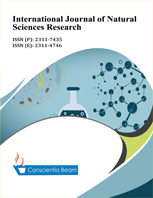Assessment of Heavy Metal Contamination of Dzindi River, In Limpopo Province, South Africa
Abstract
This study was carried out to evaluate the current water quality of Dzindi River in Limpopo Province, South Africa. pH, electrical conductivity (EC), total dissolved solids (TDS) and turbidity were measured using a pH meter, EC and TDS multimeter and a turbidimeter respectively. The water samples were collected from four different sampling points along the river and digested with concentrated nitric acid in a fume cupboard. The concentrations of the selected heavy metals (Al, Cr, Cu, Fe, Mn, Pb, and Zn) were determined in triplicate using a Perkin Elmer Flame Atomic Absorption Spectrophotometer. The pH values (7.47-7.53) from the sampling sites were lower than what is recommended by the Department of Water and Forestry (DWAF) guidelines of South Africa. The EC and TDS values obtained (30-133 mS/cm and 20.10-89.11 mg/l) were within the recommended guideline of DWAF. Turbidity values (4.61-25.82 NTU) exceeded the recommended level of ≤1NTU for domestic water use. The average concentrations of all the metals investigated were higher than the recommended levels of DWAF for the protection of aquatic life and domestic water use except copper. The order of heavy metal contamination followed the trend: Fe (1.33 mg/l) >Al (0.3 mg/l)>Mn (0.15 mg/l) >Zn (0.10 mg/l) >Cr (0.06 mg/l)>Cu (0.05 mg/l)> Pb (0.03 mg/l). Results from this investigation reveals that Dzindi River is contaminated with heavy metals and should not be used for domestic purposes without treatment due to the probable health effects it may have on the user, but it is suitable for irrigation purposes.

